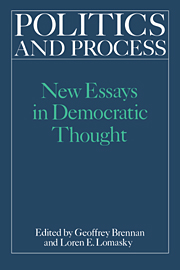Book contents
- Frontmatter
- Contents
- Acknowledgments
- List of contributors
- Introduction
- Chapter 1 The justification of democracy
- Chapter 2 Large numbers, small costs: the uneasy foundations of democratic rule
- Chapter 3 Evaluating the institutions of liberal democracy
- Chapter 4 Democracy: the public choice approach
- Chapter 5 The democratic order and public choice
- Chapter 6 Radical federalism: responsiveness, conflict, and efficiency
- Chapter 7 Contractarian presuppositions and democratic governance
- Chapter 8 In quest of the social contract
- Chapter 9 Rationality and the justification of democracy
- Chapter 10 The morality of democracy and the rule of law
- Index
Chapter 10 - The morality of democracy and the rule of law
Published online by Cambridge University Press: 29 September 2009
- Frontmatter
- Contents
- Acknowledgments
- List of contributors
- Introduction
- Chapter 1 The justification of democracy
- Chapter 2 Large numbers, small costs: the uneasy foundations of democratic rule
- Chapter 3 Evaluating the institutions of liberal democracy
- Chapter 4 Democracy: the public choice approach
- Chapter 5 The democratic order and public choice
- Chapter 6 Radical federalism: responsiveness, conflict, and efficiency
- Chapter 7 Contractarian presuppositions and democratic governance
- Chapter 8 In quest of the social contract
- Chapter 9 Rationality and the justification of democracy
- Chapter 10 The morality of democracy and the rule of law
- Index
Summary
“At the bottom of all the tributes paid to democracy,” Churchill said, “is the little man, walking into the little booth, with a little pencil, making a little mark on a little bit of paper” (speech to House of Commons, October 31, 1944). Almost everyone would agree with Churchill that democracy means rule by the people. And until recently, rule by the people would have been assumed to entail the rule of law. But in the past few decades that assumption has gone. Instead, it has become fashionable to insist that democracy is quite distinct from the rule of law, indeed hardly compatible with it.
This way of thinking about democracy is not, of course, new. Aristotle was opposing a similar view when he distinguished between just and unjust governments according to whether the rule of law prevailed. That the people decide, Aristotle argued, cannot in itself secure justice. If the people answer every question just as they please without being bound by standing rules, they are no better than a many-headed tyrant, because their decisions are wholly arbitrary. In Aristotle's world, the rule of law was rare and regularly attacked, and its friends were not likely to forget that it needed defending.
- Type
- Chapter
- Information
- Politics and ProcessNew Essays in Democratic Thought, pp. 221 - 234Publisher: Cambridge University PressPrint publication year: 1989
- 4
- Cited by



